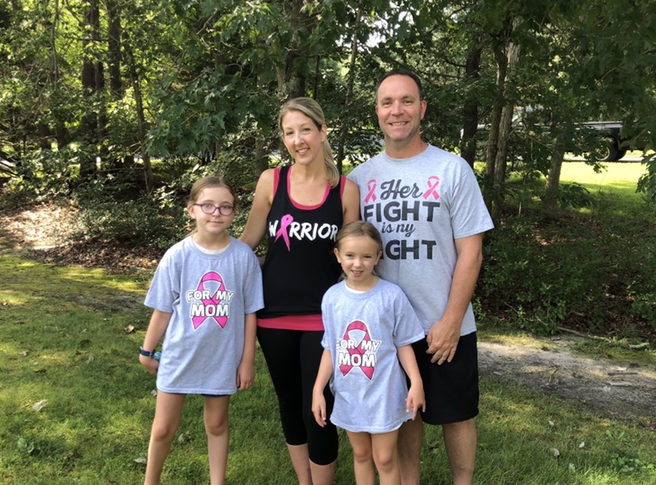Jackson Mom Can Play With Her Daughters Again After Breast Cancer

December 01, 2021
Six months after a double mastectomy and radiation for breast cancer treatment, Jessica Fioretti, now 41, was ready for the final phase of her breast reconstruction: exchanging tissue expanders for implants.
But two weeks after the surgery, something went terribly wrong.
“I began to wake up in the middle of the night, drenched in sweat. But I’d just started medication and figured that was par for the course,” Jessica says.
Her night sweats, however, had nothing to do with her new medication. “One morning, I bent to get something out of the dryer and I felt a gush pouring down my shirt,” she says. Radiation had damaged her skin so badly that it couldn’t handle the implant. “A puss-like substance just started pouring out of me.”
Jessica grabbed a beach towel and rushed to the local emergency room. She was told her right implant needed to come out immediately. After another surgery and a week in the hospital later, she finally got to go home.
Another Major Hurdle
Once again, things didn’t go as planned. Jessica’s incision wasn’t healing properly, so she was given wound vacuum-assisted closure (VAC) treatment to help improve the process. With this technique, the wound is packed with sponge-style dressing and covered with a membrane. Fluids naturally drain from the wound through the sponge, and the vacuum helps pull the edges of the wound closed and increase blood circulation to encourage healing.
In addition, a visiting nurse came to her house three times a week for wound care management.
“After about six weeks, my skin couldn’t handle the wound VAC anymore, so they removed it,” she says. “But the wound just wouldn’t heal. There was discharge, it was changing colors, there was a smell, and you could actually see my chest wall through the hole that was about the size of a quarter,” she says.
Throughout the entire summer, Jessica was miserable and frustrated. “I should have been outside playing, running around and swimming with my girls, but I couldn’t do anything,” she says. “That was the worst thing of all—knowing how much I was missing with my daughters.”
As days turned into months, Jessica began to panic. “Things were not moving in the right direction, and I needed to do something different,” she says.
She called Jersey Shore University Medical Center for a second opinion and was referred to Asaad H. Samra, M.D., director of the Center for Wound Healing at Bayshore Medical Center, because of his specialized expertise. “He’s also a plastic surgeon specializing in breast reconstruction. It was the best of both worlds for me,” Jessica says.
Light at the End of the Tunnel
After being miserable for so long, Jessica was skeptical—but desperate. Dr. Samra eased her fears instantly. “He was just so calm and understanding, and I felt like a weight was lifted,” Jessica says.
She had three different types of bacterial infections. “Dr. Samra had a concrete plan to fix me up, and although I had a long road ahead of me, I just knew I was in the right place,” she says.
“Jessica’s wound had some unhealthy tissue that needed to be removed, and we started her on an enzyme regimen to dissolve the unhealthy and infected tissue and helps clean the wound,” adds Dr. Samra.
He also recommended that Jessica begin hyperbaric oxygen therapy (HBO), where patients breathe 100-percent oxygen in a pressurized chamber. “Because Jessica’s skin had been radiated due to breast cancer treatment, she now had poor blood supply in that area, which made healing more difficult,” says Dr. Samra. “Breathing the oxygen under this increased pressure allowed Jessica to get much more oxygen into her bloodstream, helping the wound to heal.”
Jessica was nervous before the first session, but she soon realized the treatment was a time to relax and escape. “I got to watch television uninterrupted for two hours. When does a mom of two young kids ever get to do that without guilt?”
Jessica was astounded with the care she received. “My HBO nurse was incredible,” she says. “She took note of everything to make sure I was comfortable: how I like to sit, what channel I like to watch, how many blankets I like.”
Within a few months, Jessica’s wound had improved enough, so Dr. Samra was able to close it up with outpatient surgery.
Jessica gets emotional when she talks about her experience. “Dr. Samra is so kind. He’s really a patient-first doctor,” she says. “This past month, I went swimming with my girls for the first time in almost two years! I’m forever grateful I met Dr. Samra. He gave me my life back.”
The material provided through HealthU is intended to be used as general information only and should not replace the advice of your physician. Always consult your physician for individual care.
Find a doctor near me
What Does It Mean If You Have Dense Breasts?

Dense breasts? Dr. Tammaro explains the risks and what to watch for. Ocean Medical Center offers support and resources. Call 800-822-8905.
How to Prep For Your Next Mammogram

Learn how to prepare for a mammogram and what to expect during the procedure. Get tips on what to wear, when to schedule your appointment and more.
